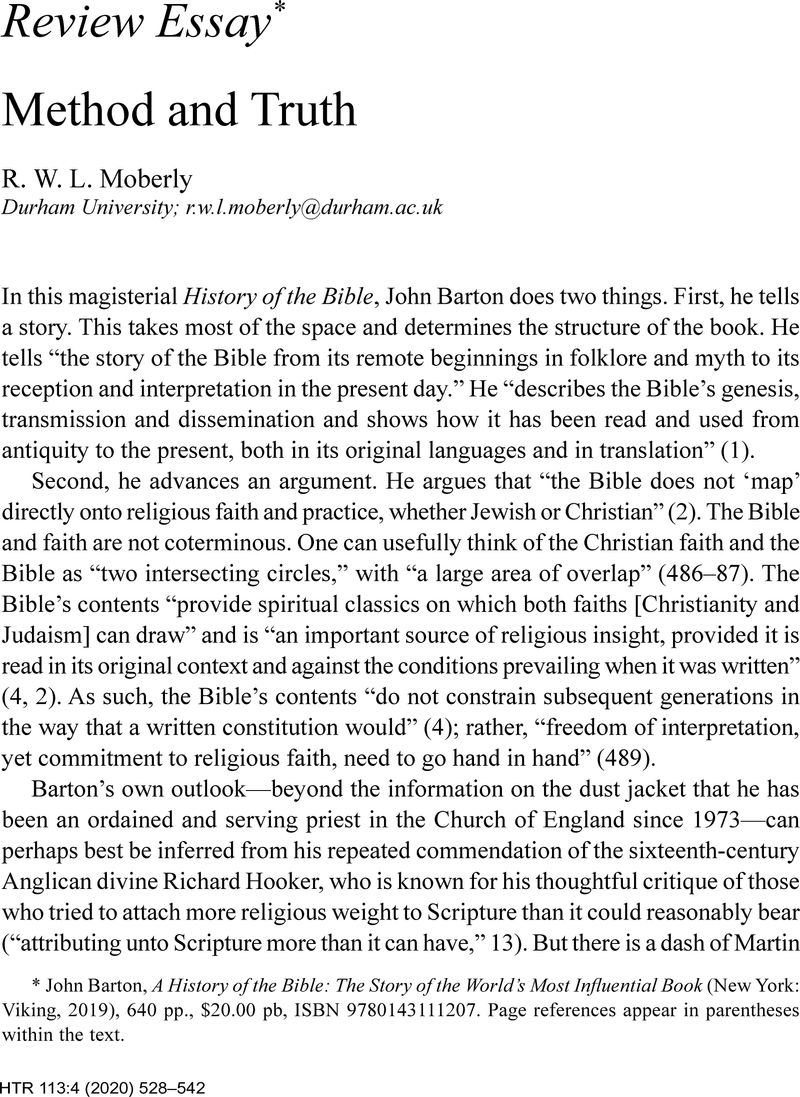No CrossRef data available.
Published online by Cambridge University Press: 28 October 2020

John Barton, A History of the Bible: The Story of the World’s Most Influential Book (New York: Viking, 2019), 640 pp., $20.00 pb, ISBN 9780143111207. Page references appear in parentheses within the text.
1 Issues posed by Judaism’s different biblical canon are, of course, recognized by Barton, especially in chapter 13, but his working assumption is that “the Bible” means “the Christian Bible,” and he does not offer an account of what is at stake in deciding which canon to privilege.
2 James Barr, Fundamentalism (London: SCM, 1977).
3 I will not linger on straightforward errors of fact, as when Barton seeks to portray a traditional Christian approach to the Old Testament via the content of the annual “Festival of Nine Lessons and Carols” from King’s College, Cambridge, on Christmas Eve. His contention that, although the carols may vary a little, the readings from the Bible “are more or less constant” and that “part of Genesis 3 is always the first reading in the service” (311) only shows that it is many years since he (or his editor) tuned in.
4 John A. T. Robinson, Redating the New Testament (London: SCM, 1976).
5 Richard Bauckham, Jesus and the Eyewitnesses: The Gospels as Eyewitness Testimony (Grand Rapids: Eerdmans, 2006; 2nd ed., 2017).
6 Barton also notes that “nothing is known of Paul except from the New Testament” (164) but makes no radically negative inferences from this.
7 J. Alberto Soggin, A History of Israel: From the Beginnings to the Bar Kochba Revolt, AD 135 (trans. John Bowden; London: SCM, 1984), 28.
8 The context of the comment about “special psychic powers” is a discussion of ANE prophets generally. But although Barton notes ways in which Israelite prophets are distinctive, unusual psychic abilities are seen as common ground.
9 This distinction, with due acknowledgment of Spinoza, also plays a key role in Barton’s 1992 inaugural lecture to his chair in Oxford, The Future of Old Testament Study (Oxford: Oxford University Press, 1993), and in his book The Nature of Biblical Criticism (Louisville: Westminster John Knox, 2007).
10 When Barton reverts briefly to the issue of inspiration in his conclusion (476–79), he gives the impression that a knowledge of the formation of the Bible, together with an appreciation of its errors, should suffice to show that “inspiration is a term that causes more problems than it solves” and that “to talk of the authority of the Bible may not require a belief in its divine inspiration at all” (479).
11 The interpretation of Spinoza’s understanding of God is controverted, but the main options appear to be some form of either “deist” or “pantheist” or “atheist.” No one, I think, would contend that Spinoza still held to the sovereignly transcendent and immanent personal deity of classic Jewish and Christian belief.
12 Hans-Georg Gadamer, Truth and Method (2nd rev. ed., London & New York: Continuum, 2004; ET of German original of 1960).